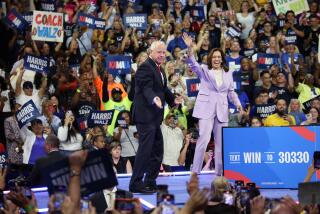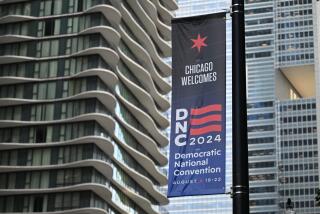Democrats pledge to revamp nominating process by 2020, but donât say how
Reporting from WASHINGTON â The Democratic Partyâs hierarchy on Saturday acknowledged the âperceived influenceâ of insiders over voters in picking a presidential nominee, but donât know yet how to settle an issue that bedeviled the bitter nomination fight between Hillary Clinton and Bernie Sanders in 2016.
At issue is the role of Democratic National Committee members, elected officials and other party dignitaries â known collectively as superdelegates â at presidential conventions. They overwhelmingly favored Clinton, who won the nomination, though her wide advantage among this group ultimately saddled her with charges of favoritism.
The DNC, at its winter meeting, approved language that committed the party to reducing the âperceived influenceâ of those party leaders in the nominating process, a goal that both Clinton and Sanders endorsed during the 2016 convention.
How to do that, the DNC didnât say. The next chance comes this summer when a party committee digs into the matter again.
The dispute pits those Democrats who want to tie the nomination more exclusively to the votersâ preferences against veteran party hands who want to maintain their sway and status in presidential politics.
The DNC chairman, Tom Perez, insists the party âwill improve the democratic processâ before 2020. Along with changing superdelegate rules, the party is promising to retool its system of nominating caucuses and primaries, with the goal of making them more accessible to voters.
Perez frames the overall effort as necessary to prevent the resentments that weighed down Clinton in 2016.
âIf weâre going to win elections, youâve got to earn the trust of voters, and many voters had a crisis of confidence in the Democratic Party,â Perez told the Associated Press, adding that the notion of DNC players âputting their thumb on the scaleâ had âa lot of negative consequences.â
Clinton issued a statement after the DNC vote praising the body for pursuing changes that would âensure a greater role [for] primaries in our nominating process.â She did not mention superdelegates, instead focusing on ideas such as same-day voter registration.
Superdelegates are convention delegates by virtue of some official post: DNC members, governors, members of Congress, party elders including past presidents and vice presidents, and former national party leaders. Unlike pledged delegates, whose ties to a specific candidate are mandated by the results of primaries and caucuses, superdelegates get to vote as they please.
At the 2016 convention, unpledged superdelegates accounted for about 15% of presidential nominating votes.
Clinton almost certainly wouldnât have needed any of them to become the nominee.
Sandersâ backers, however, cried foul over her strategy to rack up early superdelegate endorsements and claim a significant delegate lead before any primary or caucus ballots were cast.
More to Read
Get the L.A. Times Politics newsletter
Deeply reported insights into legislation, politics and policy from Sacramento, Washington and beyond. In your inbox three times per week.
You may occasionally receive promotional content from the Los Angeles Times.










